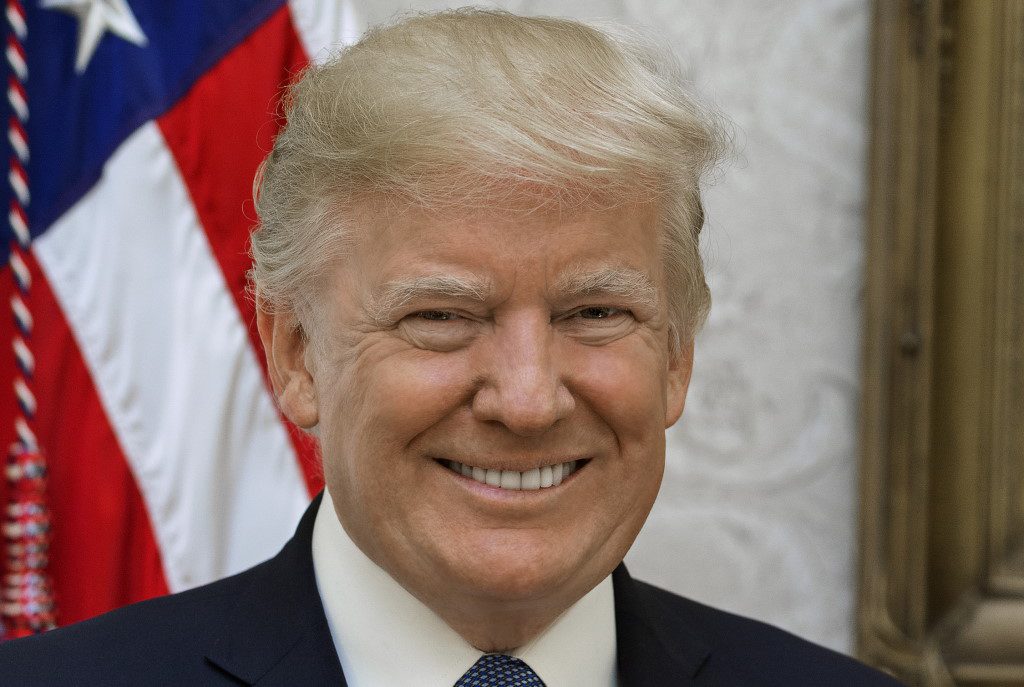Trump Attorney Memo Outlined ‘Alternate Electors’ Strategy
Strategy later used by 10 Republicans that tried to cast state's electors for Trump.

Official portrait of President Donald J. Trump, Friday, October 6, 2017. Official White House photo by Shealah Craighead. Photo is in the Public Domain.
On the same day former President Donald Trump‘s campaign asked for a partial recount that would begin its challenge of Wisconsin’s 2020 election results, a newly uncovered memo laid out the strategy for the campaign’s endgame.
The memo, which was published Wednesday by The New York Times, was sent to Jim Troupis, the lead attorney for the Trump campaign in Wisconsin in the days after the 2020 presidential election. It was written by Kenneth Chesebro, a Boston attorney who would later file a last-ditch appeal with Troupis asking the U.S. Supreme Court to overturn Wisconsin’s election results.
“It may seem odd that the electors pledged to Trump and Pence might meet and cast their votes on December 14 even if, at that juncture, the Trump-Pence ticket is behind in the vote count, and no certificate of election has been issued in favor of Trump and Pence,” Chesebro wrote. “However, a fair reading of the federal statutes suggests that this is a reasonable course of action.”
Chesebro’s memo outlined a strategy that Troupis and the Trump campaign would ultimately follow when 10 Republican electors met at the Wisconsin Capitol to cast votes for Trump on Dec. 14, 2020 despite election results — affirmed by state and federal courts — showing Democrat Joe Biden had won the state.
It was sent the day after Wisconsin’s county clerks finished their canvas of the votes, showing Biden had defeated Trump by nearly 21,000 votes, a number that changed little after the Trump campaign requested recounts of ballots in Dane and Milwaukee counties, Wisconsin’s Democratic strongholds.
“Prudence dictates that the ten electors pledged to Trump and Pence meet and cast their votes on December 14 (unless by then the race has been conceded),” Chesebro told Troupis.
That’s precisely what happened on Dec. 14, 2020, the same day Wisconsin’s actual presidential electors were meeting at the Wisconsin state Capitol to cast their votes for Biden. Ten Republican electors met elsewhere in the Capitol to cast votes for Trump that day.
Chesbro’s memo told Troupis that the basic responsibility of electors was to “make and sign six certificates of the votes given by them” for president and vice president.
“These actions are carried out without any involvement by state officials,” Chesebro said.
A U.S. House committee investigating the violent attack on the U.S. Capitol on Jan. 6, 2021 has since subpoenaed two of the “alternate” electors, including former state Republican Party chair Andrew Hitt. Committee chair Bennie Thompson, D-Mississippi, has said the slates of “alternate” electors were used to justify efforts to delay or block certification of the election during a joint session of Congress.
Hitt has said he would comply with the subpoena and issued a statement saying he acted under the “guidance of Wisconsin legal counsel” at the time. Troupis did not immediately respond to an email from WPR seeking comment on whether Chesebro’s memo was the source of that strategy.
Chesebro’s memo indicates Troupis asked for the written summary following a conference call to discuss the strategy.
Acting on behalf of the Trump campaign, Troupis asked for Wisconsin’s partial recount on Nov. 18, 2020. The chair of the Wisconsin Elections Commission signed off on the results of that recount on Nov. 30, 2020 which showed Biden had won Wisconsin by 20,682 votes.
After the case was bounced back to circuit court, then back to the Wisconsin Supreme Court again, justices rejected the lawsuit on a 4-3 vote on Dec. 14, 2020, handing down their ruling roughly an hour before electors met at the Capitol. It was the latest in a string of defeats in state and federal court for Trump and his allies.
Two days later, Troupis testified at a hearing called by Wisconsin Republican U.S. Sen. Ron Johnson, reviving many of the same arguments that had been rejected in court.
On Dec. 29, Troupis and Chesebro asked the U.S. Supreme Court to overturn the Wisconsin Supreme Court decision. The U.S. Supreme Court formally denied that lawsuit nearly two months later.
Listen to the WPR report here.
Memo to Trump lawyer outlined GOP strategy for alternate electors in Wisconsin was originally published by Wisconsin Public Radio.
More about the 2020 General Election
- Senator Agard Statement on Senator Knodl’s Continued Relitigation of the 2020 Presidential Election - Dane County Executive Melissa Agard - Aug 29th, 2023
- Report Calls For Criminally Charging State’s Fake Electors - Henry Redman - Dec 19th, 2022
- Vos Withdraws Subpoenas, Ends Gableman Probe - Henry Redman - Aug 30th, 2022
- Judge Blasts Gableman Probe, Deleted Records - Henry Redman - Aug 17th, 2022
- Vos Fires Gableman, Ends Election Probe - Shawn Johnson - Aug 14th, 2022
- Judge Orders Gableman To Pay $163,000 In Legal Fees - Rich Kremer - Aug 2nd, 2022
- Prosecute 2020 Fake Electors, Advocates Demand - Erik Gunn - Aug 1st, 2022
- Trump Calls For Nullification of Wisconsin’s 2020 Election - Henry Redman - Jul 12th, 2022
- Legal Fight Over Gableman Probe Keeps Growing - Shawn Johnson - Jun 30th, 2022
- Back In the News: Fake Elector Scheme Dogs Ron Johnson - Bruce Murphy - Jun 28th, 2022
Read more about 2020 General Election here




















